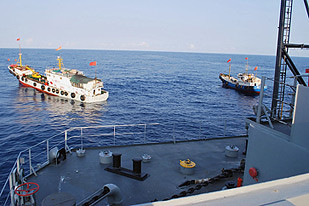
China says that the US Navy is responsible for a recent incident which could have led to a clash between their forces., a photo by Pan-African News Wire File Photos on Flickr.
China asserts its territorial claims in South China Sea
By Calum MacLeod, USA TODAY
BEIJING – Chinese travel agent Ou Nanxi has never seen such gorgeous beaches like those found on the trial cruise she took to the uninhabited islets of the southern Paracel Islands.
"There were white coral beaches and islands; the sea shone even bluer than the sky," Ou says.
Ou is confident Chinese tourists will clamor to book cruises to the islands in the South China Sea as soon as the government allows it: "It's so beautiful there, and this is Chinese territory."
Vietnam disagrees, having been forced off the island chain in 1974 by the People's Liberation Army. Today, the Paracels are among 200 islands, coral outcrops and banks whose ownership and resources China says are its alone to exploit.
The Philippines, Taiwan, Malaysia, Brunei and Vietnam all claim ownership of the islands nearest them. But China claims sovereignty over all — nearly 1.2 million square miles that includes territory hundreds of miles from its mainland shore.
China recently said it will begin developing tourism on the Paracels. The announcement was one of several instances in which China is starting to assert sweeping claims over most of the South China Sea's islands, fishing grounds and unexplored deposits of oil and natural gas.
Philippine navy troops inspect a Chinese fishing vessel loaded giant clam shells after it was intercepted off Scarborough Shoal.
A clash between East and West is perhaps unavoidable, given that the United States says it will protect freedom of navigation and commerce for all Asian nations in what is one of the world's busiest shipping routes, some experts say.
"China has boxed itself in," says Stephanie Kleine-Ahlbrandt, North East Asia project director for the International Crisis Group.
She says China has so convinced its public of their country's claims that significant policy shifts will be tough. In "Stirring up the South China Sea," a report issued this week, the group notes a dramatic increase in hostile incidents between maritime forces in recent years.
Beijing moderated its stance in 2011 after tensions led its neighbors to seek closer military ties with the U.S. But "the conflicting mandates and lack of coordination" among Chinese government agencies running maritime policy continue to stoke tensions, the report says.
In the latest confrontation, Chinese and Philippine ships have been in a naval standoff for nearly three weeks after the Philippines intercepted Chinese fishing boats plying the waters of Scarborough Shoal, named for a tea ship that wrecked there in the 18th century.
The shoal is 472 nautical miles from China's coast, and 124 nautical miles from the Philippines, inside the 200 nautical miles that international law defines as a nation's exclusive economic zone. On Thursday, the Philippines accused China of violating a 2002 non-aggression pact when Chinese government ships prevented Philippine authorities from arresting Chinese fishermen in the shoal.
The shoal is among the many spots in the South China Sea that have been claimed and occupied by various nations over the centuries. China's claim, covering about 80% of the sea, and based on its interpretation of history, not current international law, has long worried its neighbors.
The U.S. wants the territorial disputes settled by negotiation. But the U.S. is allied with most of China's rivals and conducted this week long-planned naval exercises in the region with Vietnam and the Philippines.
Further northeast, the U.S. is conducting annual drills with South Korea, while China this week began naval drills with Russia in the Yellow Sea.
Philippine President Benigno Aquino said the world must know what "China is doing to us. If we are being treated this way, countries of the same size or those smaller can also be given the same treatment."
The U.S. military activities are stoking Chinese suspicions that Washington is plotting to halt China's rise as a power.
Through its drills, the U.S. intends to "use those southeast Asian countries who have frictions with China to confront China … and achieve its goal of containing China," Zhu Zhenming, a researcher at the Yunnan Academy of Social Sciences, told the China Business News on Wednesday.
The rise of incidents such as Scarborough Shoal "increases the risk of an accidental clash that could escalate into a military or diplomatic crisis," says Ian Storey of the Institute of Southeast Asian Studies in Singapore. "It's only a matter of time before one side opens fire on the other, and there will be casualties."
Negotiation will prevent conflicts, says Zhang Yulan, a southeast Asia expert at the Chinese Academy of Social Sciences, a government think tank in Beijing. "China's recent aggressiveness was caused by neighboring countries such as Philippine and Vietnam," he says.
Some foreign policy experts say only a strengthened U.S. naval presence will prevent China from taking over. The South China Sea will be "the strategic bellwether for determining the future of U.S. leadership in the Asia-Pacific region," wrote Patrick Cronin and Robert Kaplan in a report by the Center for a New American Security.
On Hainan Island, travel agent Ou has no doubt who will emerge the winner among China and its neighbors.
"I understand there have been disputes going on for years," Ou says, "but I'm sure they can be solved through mediation because China is stronger than all those countries."
Contributing: Sunny Yang
No comments:
Post a Comment